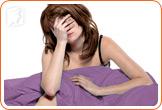
Menopause is a natural transition that all women go through as their bodies become infertile. One of the most common symptoms of menopause is night sweats. Nearly 75% of menopausal women experience them and the frequency and severity vary for everybody.
Night sweats can be very uncomfortable and disrupt your sleep and even cause fatigue and stress throughout the day. Other disturbing effects of night sweats include irregular heartbeat, chills, and nausea. Keep reading for a possible day plan to battle menopausal night sweats.
Daily Routine for Night Sweats
7 a.m.

When you wake, try going for a quick run. As little as 30 minutes is enough to increase your heart rate and blood flow. Running is also beneficial to maintaining a healthy weight, increasing your cardiovascular strength, and obtaining better sleep quality.
8 a.m.
Take a shower in lukewarm water. Eat a healthy and nutritious breakfast that will keep you energized and able to focus throughout the day. If your night sweats are severe, drinking a cup of herbal tea with your breakfast, this can help alleviate the symptoms.
9 a.m. - 5 p.m.

It can be hard to avoid stress at work, but try to remain calm. Try to keep your desk organized, taking breaks to stretch your legs and walk, and take time to laugh. Also keep healthy snacks and plenty of water nearby.
6 p.m.
After work, try to rest by spending some time alone. Do something that will take your mind off of the stresses from the day like reading, walking, or even yoga.
7 p.m.

Again, prepare a well balanced meal. Try to avoid spicy foods, alcohol, caffeine, and sugar, because they can trigger night sweats.
10 p.m.
Before going to bed, make sure your room temperature is set to low. Also arrange bedding as needed and keep a glass of water and handheld fan nearby. You may also consider asking your partner not to sleep so close or in a separate bed.
Other Tips to Consider
Clothing

Do not wear anything that is too tight or restricting. Choose fabrics that are lightweight and breathable, such as polypropylene or specially designed sleepwear.
Bedding
Avoid using satin and silk sheets because they will not absorb the sweat. If using cotton, pick a lower thread count to allow for more air circulation. Try layering the bedding so that you can add or remove pieces as your temperature changes.
Water
Always keep it handy to help lower body temperature and replenish your body after sweating.
More about Night Sweats
Avoiding the common triggers, such as spices, alcohol, and caffeine is one thing but why not try to get into a routine. These routines should include daily exercises, nutritious meals, and enough sleep.
Sources
- Boston Women's Health Collective. "Hot Flashes, Night Sweats, and Sleep Disturbances." Our Bodies, Ourselves, 2006.
- The National Institute of Health.(n.d). "Signs of the Menopausal Transition." Retrieved from www.nih.gov.
- Von Muhlen, DG et al. "A community-based study of menopause symptoms and estrogen replacement in older women." Maturitas. Sept 1995; 22(2): 71-8



